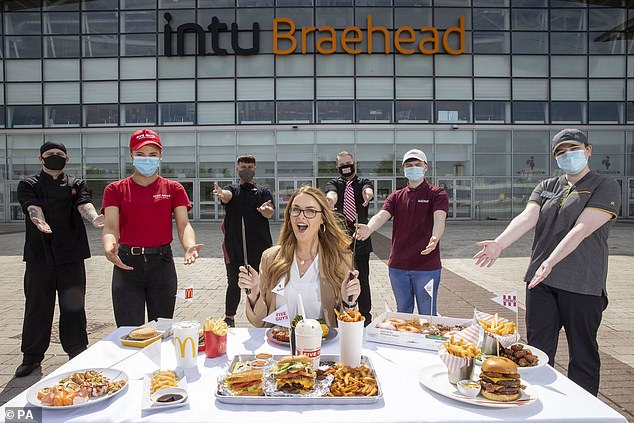
More than half of the country’s restaurants, cafes and pubs have signed up to provide a 50 per cent discount on meals and soft drinks from today.
More than 90 chains including McDonald’s, Nando’s, Pizza Express and Costa Coffee are among the 72,000 venues taking part in Eat Out to Help Out.
Thousands of independent venues including at least 40 Michelin starred restaurants have also registered with the scheme, backed by £500million of taxpayers’ cash.
Diners who eat out on Mondays, Tuesdays and Wednesdays during August will have half of their bill covered by the government, up to £10 per head.
To use the postcode checker which reveals participating restaurants in the Eat Out to Help Out scheme within two miles of where you live, click here
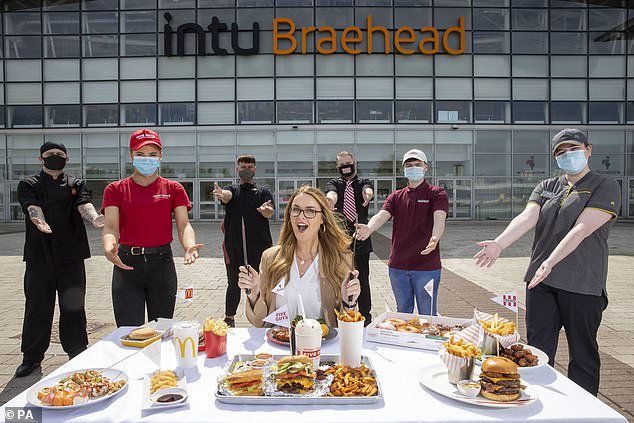
Madison Dock (centre) from Johnstone, Renfrewshire, sits outside intu Braehead in Glasgow where diners will be able to enjoy half-price meals, at participating restaurants from today
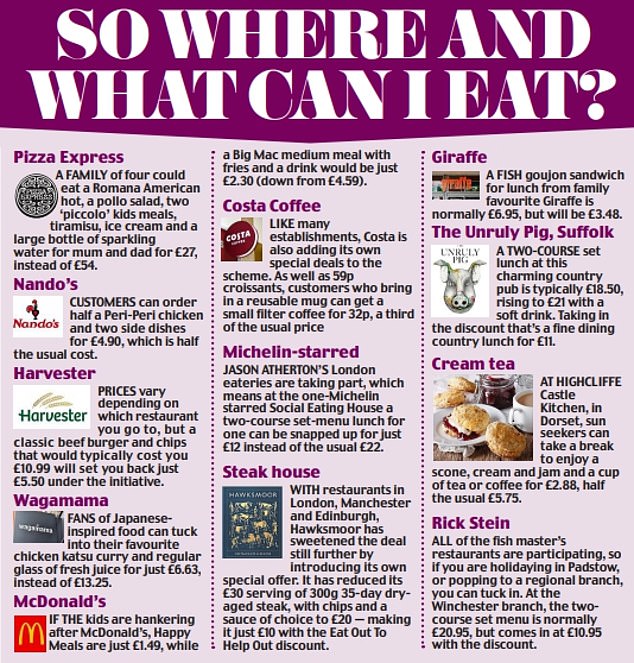
Chancellor Rishi Sunak announced the scheme that is designed to boost the hospitality industry in his summer economic update last month.
The discount means that a £50 restaurant bill for a family of four would be reduced to £25. A couple spending £60 would only have to pay £40.
Soft drinks and food will be included in the deal although alcohol will not. Meals must be consumed on the premises so takeaways will be not discounted.
There has been some criticism that the government is providing a taxpayer-funded subsidy for fast food at the same time as urging the nation to lose weight.
The move is designed to increase confidence among the public and encourage people to visit restaurateurs, many of whom were badly hit by the coronavirus pandemic, particularly during the lockdown months when much of their business was put on hold.
But critics have aimed fire at the interventionist plan and said fast-food outlets serving unhealthy products should have been banned from participating due to fears the subsidised costs could fuel obesity.
It also attracted controversy once it emerged that Mr Sunak had to make a ministerial order to enact the policy after HM Revenue and Customs chief executive Jim Harra said there was ‘uncertainty surrounding the value for money of this proposal’.
Around 80 per cent of hospitality firms stopped trading in April, with 1.4 million workers furloughed – the highest of any sector – according to Government data.
Many of the outlets that have reopened have been forced to operate with fewer covers to comply with social distancing rules, while also having in some cases to introduce screens and one-way systems as part of efforts to make their premises Covid-secure.
Mr Sunak said last night: ‘Our Eat Out to Help Out scheme’s number one aim is to help protect the jobs of 1.8 million chefs, waiters and restaurateurs by boosting demand and getting customers through the door.
‘More than 72,000 establishments will be serving discounted meals across the country, with the government paying half the bill.
‘The industry is a vital ingredient to our economy and it’s been hit hard by coronavirus, so enjoy summer safely by showing your favourite places your support – we’ll pay half.’
No vouchers are required for those booking tables, with the participating establishment deducting 50 per cent from the bill and charging the discount to the Treasury.
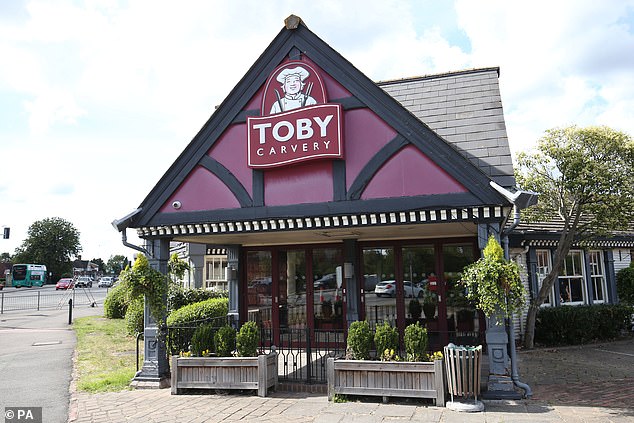
Toby Carvery in Langley, Slough, one of the participating restaurants in Eat Out to Help Out
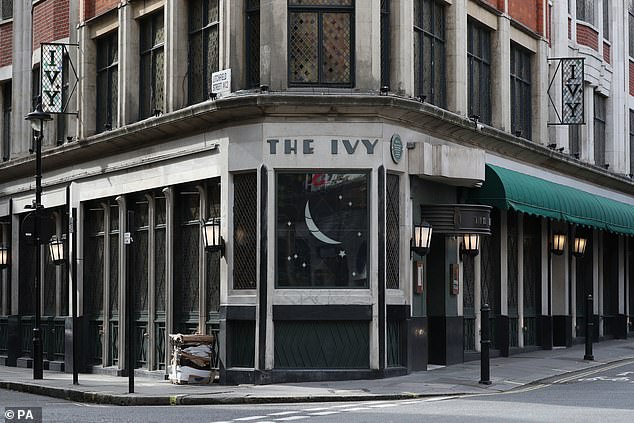
The Ivy Restaurant in London, one of the participating restaurants where diners will be able to enjoy half-price meals from today as the Government begins its Eat Out to Help Out scheme
Officials said there had been more than 3.3 million hits on the Eat Out to Help Out restaurant finder website since it started up last week, giving an indication of the demand for the month-long saver scheme.
But Munira Wilson MP, the Liberal Democrat health spokeswoman, said the Chancellor should have prevented diners from using the discount to buy junk food.
The start of the scheme comes only a week after Prime Minister Boris Johnson unveiled the Government’s obesity crackdown.
‘We all recognise the need to support the high street through the pandemic, but the Government should have been more discerning with this scheme,’ said Ms Wilson.
‘Obesity is already an immense challenge for people and the NHS, but the latest research suggests it also contributes to the deadliness of coronavirus.
‘With a number of fast-food chains signing up to the scheme, it seems clear that public health did not factor into the Government’s decision.
‘The Government must put public health first and exclude from the scheme meals and drinks proven to contribute to obesity. We cannot afford to risk lives as we reopen the economy.’
The new scheme has also faced criticism from politicians in northern areas who say it is unhelpful in newly locked-down parts of Lancashire and Greater Manchester.
The Mayor of Greater Manchester, Andy Burnham, described the scheme as a mistake, saying the government should not be subsidising meals out without releasing funds for low-paid workers to take time off to self-isolate.
Writing in the Sunday Mirror, he said: ‘National lockdown was eased too soon and encouraging people back to the pub on Super Saturday was a big mistake as is the Eat Out to Help Out scheme.
‘We shouldn’t spend taxpayers’ money on subsidizing meals out but not support the low-paid to take time off work to protect their health.’
The Treasury previously said 130,000 businesses were eligible to sign up for the scheme.
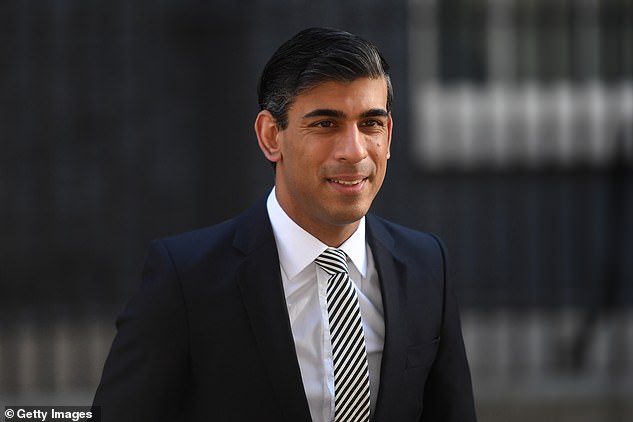
More than 72,000 eateries have signed up to the scheme, according to Chancellor Rishi Sunak
A Treasury spokesman said: ‘The Eat Out To Help Out scheme is designed to help protect the jobs of the 1.8 million hard-working people employed by restaurants, cafes and pubs across the UK.
‘We’ve worked with the hospitality industry and the devolved administrations to put in place guidelines so people are able to enjoy summer safely in Covid-secure establishments.’
In Scotland, at least 3,766 outlets have signed up, though this figure does not include chains which have more than 26 premises.
Scottish Secretary Alister Jack said: ‘Eat out to help out is a fantastic scheme which will help Scotland’s hospitality businesses get back on their feet.
‘I am very pleased that 3,766 Scottish restaurants, bars and cafes have signed up.
‘This is a great opportunity for people in Scotland to get together with friends and family in a safe environment and get up to 50% off their bill.
‘The UK Government is doing all it can to drive our economic recovery, and we want to see all sectors of our economy open again where it is safe to do so.’
Meanwhile, a study suggests there is a risk that participants will use the saving to pile their plates with high calorie foods weighed down with sugar, fat and salt.
It was conducted by weight loss experts Noom, which said: ‘Britons could unwittingly consume an entire day’s calories in one meal through the scheme.’
Researchers said: ‘Guests visiting their local Nando’s can normally order Chicken Butterfly, chips and coleslaw, which totalling 1,080 calories, for £10.30.
‘However, with the government’s scheme, they can add peri-peri nuts and carrot cake, which would bring the order total to just £8.85 but a whopping 2,610 calories.
‘That would put this single meal over the NHS daily recommended intake by over 100 calories.’
The Eat Out to Help Out scheme follows hot on the heels of the Government’s obesity strategy announcement and a call from Mr Johnson for people to lose five pounds in weight.
It includes controls on junk food advertising, the sale of chocolates, crisps and sweets at checkouts. It also wants food businesses to display calories on menus.
Chief of Psychology at Noom, which encourages lifestyle changes, Andreas Michaelides, (correct) said people do not have to give up treats, but rather take care of their wider diet.
‘It can be tricky to choose healthier options when eating out, especially with such an enticing offer from the UK Government,’ he said.
‘While lockdown has impacted all of our day-to-day routines, it also offers the unique opportunity to develop new habits for our new normal, including cooking meals from scratch at home, where we have greater control over ingredients and portions.
‘The goal is not to remove all indulgences, but to approach them mindfully and with purpose.’
Professor of public health nutrition at Teesside University, Amelia Lake, said: ‘Offering subsidies on food which is particularly associated with being less healthy completely contradicts the other message around reducing obesity.
‘On one hand we are hearing that tackling obesity is an urgent public health challenge, but on the other we are seeing actions that we know do not help us reduce obesity. There needs to be clear messaging and joined up action.’






More Stories
Healing Streams Live Healing Services with Pastor Chris: Miracles Await this March 14th – 16th, 2025!
Essential Care for Hermann’s Tortoise: A Guide to Thriving Pets
Nail Decisions: Which is Better for You, Acrylic or Gel?